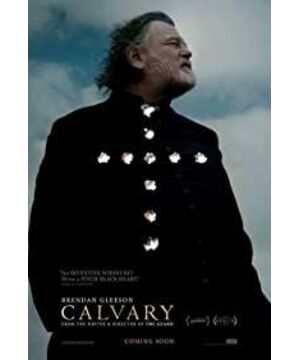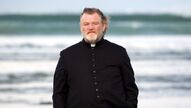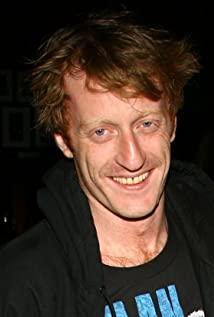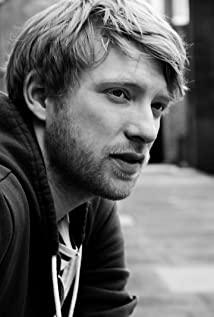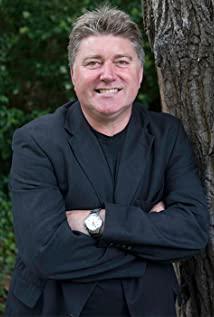Before downloading this movie, I skimmed that this movie was classified in the "Comedy Movies" column. When I first watched it, I really thought it was a comedy movie, because it had a dramatic beginning: a stranger said to the priest when he was repenting, hey, let me tell you in advance that I will kill in seven days. After you, you are now ready for your fuss. Even more dramatic is that the priest silently accepted that he was about to be killed. I thought the plot development of the movie was that after the priest prepared all the coffins and left his suicide note, I discovered that all this was actually just a prank. Of course, the plot did not develop in this way, and the atmosphere of the movie became heavier and heavier. In the first half of the film, the director tried his best to render the collapse of religious beliefs in small towns in Ireland—the rude and brutal pig slaughter, the licentious doctor's assistant, the rebellious priest and the daughter of a chaotic emotional life, everyone seems to be betraying God. The fallen. The priest who represents the prestige of God is reduced to a "moral patient" who is incompatible with the residents of the town. People not only refuse to heed his advice, but add ridicule and ridicule, and some people take action against the "nosy" priest. In the end, even his church was destroyed by arson. The greatness of God has not been respected by the lay people, and has been oppressed by the lay people with evil deeds. In this case, even the priest himself is lost. Why is God not working at all? If the purpose of religion is to obtain the greatest good, then what is good? One way of explanation is that good is that everyone does good deeds instead of doing bad things; the other way of explanation is that people need to pay for evil deeds. To some extent, these two explanations can be combined: as long as evil is punished, good will be manifested. In this kind of faith background, a person may have a crisis of faith and question the existence and authenticity of religion because he witnesses the rampage of evil and does not receive the punishment he deserves. The answer to the famous theism in theology—why God created evil—is also an attempt to resolve this question. The priest also fell into the mud and couldn't extricate himself. Because goodness can only be realized in the community. No matter how good you are, only others who have evil can cause your beliefs to collapse. If the priest sinks into this religious narrative, then the story may come to an abrupt end after he takes off his robe. If the development of the plot is the world's conscience discovery through one or two things, it is positive to be good, or it is the priest. Since then, he fell and became an atheist, which is not a story, because it is either too old-fashioned or too realistic. Fortunately, the director turned to existential theology. He used another way to narrate-the ultimate goal of religion is to teach people forgiveness. Evil and sin don’t get what they deserve External punishment, this is indeed desperate. However, forgiveness can bring a new experience of evil and sin—just like the famous phrase in the Bible, "If someone slaps you on the left cheek, then stretch your right cheek over and let him do it." It gets rid of it. In human nature, the emotional emotions that are not controlled by intelligence (revenge is based on anger), and also get rid of the instrumental rational calculation in human nature. Forgiveness itself is the purpose of value self-sufficiency, and there is no need to add purpose to it. As a result, people get a transcendent baptism in forgiveness, eradicate the secular roots of thought, and reach a realm closer to God and more sacred. In this context of belief, two positions will evolve: The opposing position believes that this kind of religious knowledge avoids the core issues in secular life, and replaces religious rationality with "sacredness", which will inevitably fall into "mysticism". In the whirlpool. Another kind of understanding is that existential theology—the truth of religion is leaps and bounds. As long as you believe in your heart and devote yourself to religious life, in fact, you have already gained everything relative to yourself. truth. Existential theology is not talking about—let’s take a gamble of faith: if you win, you have the right truth; if you lose, you won’t lose anything, so you still believe in it—but as long as you believe , You must have the truth. This has nothing to do with right or wrong, because the standard and frame of reference have been lost. What is the meaning of right or wrong? For individuals, as long as you believe in religion, then the effect of religion on you is the effect of truth. Forgiveness also plays a role in this sense, so it is internalized and does not require the participation of outsiders-I forgive you, and it has nothing to do with whether you are willing to be forgiven by me. Therefore, after a conversation with a widowed but still optimistic woman at the airport, the priest put on the robe again and changed from a chattering "moral patient" to a benevolent forgiver, forgiving what had happened in the small town. All kinds of unpleasantness. He re-recognized the religion he had always believed in before, and the seven-day deadline was about to come. At the end of the story, the priest was shot at the beach by a gunman who had a mentality of revenge for the society because of his tragic childhood. At the moment he fell, at the last moment of his life, the last word he left was to the person who shot him. Say: It's not too late. The forgiver is against the unforgiver, the priest is the killer of the breakdown of faith, and the sanctity of religion is highlighted at this moment. The priest is still dead, but God is alive again. Near and more sacred realm. In this context of belief, two positions will evolve: The opposing position believes that this kind of religious knowledge avoids the core issues in secular life, and replaces religious rationality with "sacredness", which will inevitably fall into "mysticism". In the whirlpool. Another kind of understanding is that existential theology—the truth of religion is leaps and bounds. As long as you believe in your heart and devote yourself to religious life, in fact, you have already gained everything relative to yourself. truth. Existential theology is not talking about—let’s take a gamble of faith: if you win, you have the right truth; if you lose, you won’t lose anything, so you still believe in it—but as long as you believe , You must have the truth. This has nothing to do with right or wrong, because the standard and frame of reference have been lost. What is the meaning of right or wrong? For individuals, as long as you believe in religion, then the effect of religion on you is the effect of truth. Forgiveness also plays a role in this sense, so it is internalized and does not require the participation of outsiders-I forgive you, and it has nothing to do with whether you are willing to be forgiven by me. Therefore, after a conversation with a widowed but still optimistic woman at the airport, the priest put on the robe again and changed from a chattering "moral patient" to a benevolent forgiver, forgiving what had happened in the small town. All kinds of unpleasantness. He re-recognized the religion he had always believed in before, and the seven-day deadline was about to come. At the end of the story, the priest was shot at the beach by a gunman who had a mentality of revenge for the society because of his tragic childhood. At the moment he fell, at the last moment of his life, the last word he left was to the person who shot him. Say: It's not too late. The forgiver is against the unforgiver, the priest is the killer of the breakdown of faith, and the sanctity of religion is highlighted at this moment. The priest is still dead, but God is alive again. Near and more sacred realm. In this context of belief, two positions will evolve: The opposing position believes that this kind of religious knowledge avoids the core issues in secular life, and replaces religious rationality with "sacredness", which will inevitably fall into "mysticism". In the whirlpool. Another kind of understanding is that existential theology—the truth of religion is leaps and bounds. As long as you believe in your heart and devote yourself to religious life, in fact, you have already gained everything relative to yourself. truth. Existential theology is not talking about—let’s take a gamble of faith: if you win, you have the right truth; if you lose, you won’t lose anything, so you still believe in it—but as long as you believe , You must have the truth. This has nothing to do with right or wrong, because the standard and frame of reference have been lost. What is the meaning of right or wrong? For individuals, as long as you believe in religion, then the effect of religion on you is the effect of truth. Forgiveness also plays a role in this sense, so it is internalized and does not require the participation of outsiders-I forgive you, and it has nothing to do with whether you are willing to be forgiven by me. Therefore, after a conversation with a widowed but still optimistic woman at the airport, the priest put on the robe again and changed from a chattering "moral patient" to a benevolent forgiver, forgiving what had happened in the small town. All kinds of unpleasantness. He re-recognized the religion he had always believed in before, and the seven-day deadline was about to come. At the end of the story, the priest was shot at the beach by a gunman who had a mentality of revenge for the society because of his tragic childhood. At the moment he fell, at the last moment of his life, the last word he left was to the person who shot him. Say: It's not too late. The forgiver is against the unforgiver, the priest is the killer of the breakdown of faith, and the sanctity of religion is highlighted at this moment. The priest is still dead, but God is alive again. Because the standard and the frame of reference have been lost, what is the meaning of right and wrong? For individuals, as long as you believe in religion, then the effect of religion on you is the effect of truth. Forgiveness also plays a role in this sense, so it is internalized and does not require the participation of outsiders-I forgive you, and it has nothing to do with whether you are willing to be forgiven by me. Therefore, after a conversation with a widowed but still optimistic woman at the airport, the priest put on the robe again and changed from a chattering "moral patient" to a benevolent forgiver, forgiving what had happened in the small town. All kinds of unpleasantness. He re-recognized the religion he had always believed in before, and the seven-day deadline was about to come. At the end of the story, the priest was shot at the beach by a gunman who had a mentality of revenge for the society because of his tragic childhood. At the moment he fell, at the last moment of his life, the last word he left was to the person who shot him. Say: It's not too late. The forgiver is against the unforgiver, the priest is the killer of the breakdown of faith, and the sanctity of religion is highlighted at this moment. The priest is still dead, but God is alive again. Because the standard and the frame of reference have been lost, what is the meaning of right and wrong? For individuals, as long as you believe in religion, then the effect of religion on you is the effect of truth. Forgiveness also plays a role in this sense, so it is internalized and does not require the participation of outsiders-I forgive you, and it has nothing to do with whether you are willing to be forgiven by me. Therefore, after a conversation with a widowed but still optimistic woman at the airport, the priest put on the robe again and changed from a chattering "moral patient" to a benevolent forgiver, forgiving what had happened in the small town. All kinds of unpleasantness. He re-recognized the religion he had always believed in before, and the seven-day deadline was about to come. At the end of the story, the priest was shot at the beach by a gunman who had a mentality of revenge for the society because of his tragic childhood. At the moment he fell, at the last moment of his life, the last word he left was to the person who shot him. Say: It's not too late. The forgiver is against the unforgiver, the priest is the killer of the breakdown of faith, and the sanctity of religion is highlighted at this moment. The priest is still dead, but God is alive again.
View more about Calvary reviews


